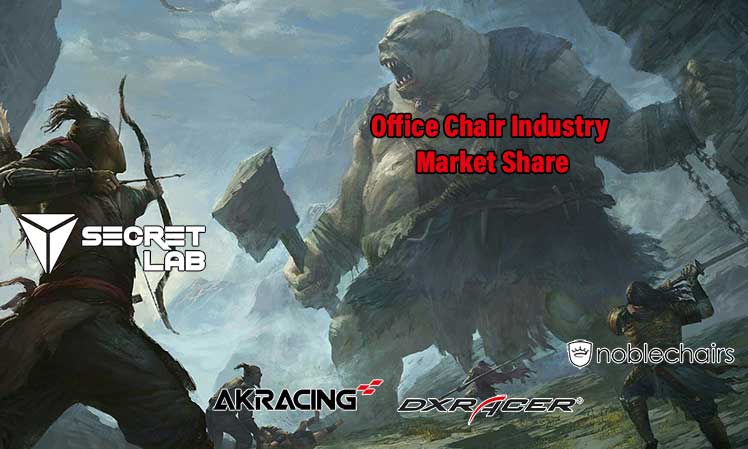Most of the world’s top office furniture companies are publicly traded. This requires them to file financial reports each fiscal year. Most released their 2024 reports this spring and summer. These reports tell similar stories. Learn from these filings how office furniture giants are managing hybrid work disruption, supply chain challenges, and changing workplace needs of 2025.

Among the top companies, Haworth is the only private one. Even so, they released financial data for fiscal 2024. Based on all year-end reports and Haworth’s disclosure, here’s how the top office furniture companies performed:
| 2024 Earnings (USD billions) | 2023 Earnings | 2022 Earnings |
|
Wild Card: HNI + Steelcase $5.6 Billion combined
|
Wild Card: MillerKnoll $4.09 Billion combined ▲
|
Wild Card: MillerKnoll $3.9 Billion combined ▲
|
MillerKnoll maintained its industry leadership but faced setbacks. HNI and Kokuyo showed resilience in uncertain times with positive growth.
HNI Corporation Acquires Steelcase
On August 4, 2025, HNI announced the acquisition of Steelcase for $2.2 billion. HNI CEO Jeffrey Lorenger said the acquisition comes as “in-office work trends accelerate”. The deal alters the industry power structure. The combined HNI-Steelcase entity sits on top, with MillerKnoll a distant second:
| 2024 Earnings (USD billions) | 2023 Earnings (USD billions) |
|
Wild Card: HNI + Steelcase $5.6 Billion combined
|
|
Office Furniture Company Spotlights
Here’s a quick look at each company’s status based on their annual report filings:
MillerKnoll -11.2% ▼
- Fiscal 2024: $3,628.4 million ($3.63 billion) -11.2% ▼
- Fiscal 2023: $4,087.1 million ($4.09 billion)
According to its 2024 report(1), MillerKnoll’s total revenue decreased by 11.2% compared with 2023. The company saw decreased sales volume in all regions. Two primary reasons were given for the drop:
- End of post-pandemic buying frenzy: fiscal 2023 reported unusually high sales because of post-pandemic demand. This demand did not repeat in fiscal 2024.
- Economic concerns: higher interest rates, tepid housing demands, and low consumer confidence levels affect luxury markets and “discretionary spending on goods”.
Steel Price Vulnerability
Beyond market conditions, “The Company’s financial performance is sensitive to changes in certain input costs, including steel and steel component parts”.
Steel is listed as the “largest of such costs incurred by the Company”, ahead of plastics, textiles, wood particleboard and aluminum components.
Significantly, China makes up around 50% of global steel production. “Given the significance of steel costs to our direct materials costs, we closely monitor trade tensions between the U.S. and China”
Steel status: Chinese steel products face a 50% tariff under Section 232 (steel and aluminum tariffs), which was increased from 25% on June 4, 2025.(6)
Company Outlook
Given so much uncertainty in the market, the company doesn’t have a definitive strategy. Their main initiative focuses on B2C:
Steelcase -2% ▼
Based on the Steelcase report(2), revenue of $3.16 billion in fiscal 2024 was down from $3.23 billion in fiscal 2023. The report cites an 8% decrease in international revenue, which was “broad based across most markets in EMEA and China, largely related to macroeconomic factors”. These include:
- EMEA interest rate & inflation pressure: The European Central Bank raised interest rates by 450 basis points between July 2022 and September 2023, maintaining high rates through 2024 to combat inflation. This caused weak growth in the office furniture manufacturing sector.
- Geopolitical uncertainty: the Ukraine war and other geopolitical tensions caused a deteriorating manufacturing outlook across the EU, alongside uncertainty surrounding energy prices.
- Chinese housing crisis: Real property investment was projected to fall by 30-60% from end-2022 levels, with wide spillovers to other sectors.(7)
- Chinese economic downturn: China’s office furniture industry growth was closely tied to the country’s commercial real estate sector and ongoing urbanization initiatives, both of which were under pressure.(8)
On the flip side, the company saw an 8% growth in orders in the Americas:
Beyond steel, tariffs are a minor concern, as Steelcase produces its chair regionally. Its Reynosa, Mexico factory serves the Americas; they maintain plants in Malaysia, China, Japan, and Thailand to serve the Asia Pacific; a factory in the Czech Republic supplies Europe.
Company outlook: strong. The large base of Steelcase corporate customers increases with the HNI merger. Once macroeconomic conditions improve, Steelcase is poised for dominance.
HNI 3.8% ▲
According to its 2024 filing(3), HNI’s reported revenue grew 3.8%, from $2.4 billion to $2.53 billion. Key reasons:
- Full year impact of Kimball International acquisition: Added $228.0 million in sales compared to 2023 (since Kimball was only owned for 7 months in 2023 vs. full 12 months in 2024)
- Price realization: The company achieved price increases in both business segments (workplace furnishings and residential building products)
According to the report, the above factors “drove strong growth in workplace furnishings operating margin for the year.” However, “demand variability driven by macroeconomic conditions and U.S. election ambiguity” particularly impacted the latter portion of the year.
Office Furniture Industry B2C Trends
Moving towards the end of the 2025 calendar year, here are the world’s top office furniture companies, based on reported earnings from fiscal 2024:
- HNI Steelcase: $5.69 billion in total revenue
- MillerKnoll: $3.16 billion in total revenue
- Haworth: $2.5 billion in total revenue
- Kokuyo: $2.29 billion in total revenue
Excluding Kokuyo, all major players are somewhat protected from tariffs, with manufacturing plants scattered around the world. All share similar challenges moving forward:
- Rising steel prices: U.S. tariffs on Chinese steel are now at 50%.(6) Higher steel prices will result in higher costs passed to consumers.
- Economic uncertainty: MillerKnoll faced reduced discretionary spending due to higher interest rates and low consumer confidence. Steelcase saw broad-based international revenue declines from EMEA inflation pressure and Chinese economic downturn. Even HNI, despite growth, experienced “demand variability driven by macroeconomic conditions and U.S. election ambiguity” in the latter part of 2024. These uncertain conditions are expected to persist into 2025, affecting capital expenditure decisions and workplace investment timing.
- Hybrid work transition: The post-pandemic office furniture buying surge has ended, leaving companies to navigate the new reality of hybrid work models. While some large corporate customers are investing to “create inspiring workplaces” and encourage stronger in-office presence (as Steelcase noted), overall demand patterns remain volatile as organizations continue optimizing their space requirements.
- Supply chain regionalization: Companies are strategically positioning manufacturing closer to end markets to mitigate tariff exposure and transportation costs. This trend toward regional production hubs will likely accelerate, with implications for capacity allocation and investment priorities across global operations.
Office Furniture Industry Consumer Outlook
Based on these industry conditions, consumers can expect:
- Higher prices: Steel tariffs and increased manufacturing costs will inevitably be passed through to end customers. Office furniture prices are likely to rise across all major brands, with steel-heavy products (desks, filing cabinets, structural components) seeing the most significant increases.
- Product innovation focus: Companies are accelerating their development of hybrid-work solutions—furniture designed for flexible spaces, home-office integration, and reconfigurable layouts. Expect new product lines targeting the evolving needs of distributed workforces.
- Market consolidation benefits: The HNI-Steelcase merger creates a dominant player with enhanced negotiating power and broader product portfolios. While this may limit competition in some segments, it could also drive innovation and potentially stabilize pricing through economies of scale.
- Regional price variations: Tariff protection through local manufacturing may create pricing advantages in certain markets, making regional sourcing decisions more critical for large corporate buyers seeking cost optimization.
Previous Furniture Industry Reports

These office chair industry reports document how the major players navigated through pandemic challenges:
- 2023 Office Furniture Industry Report
- 2024 Office Furniture Industry Report
- 2020 Office Furniture Industry Report: Lockdown edition
Gaming Chair Industry Reports

These reports show how COVID lockdowns help the gaming chair industry compete and thrive against multi-billion-dollar office furniture giants:
Footnotes
- MillerKnoll, Inc., Annual Report on Form 10-K, Fiscal Year Ended June 1, 2024. Available at: https://www.millerknoll.com/investor-relations/financials-filings/annual-report
- Steelcase Inc., Annual Report on Form 10-K, Fiscal Year Ended February 28, 2024. Available at: https://ir.steelcase.com/financial-information/annual-reports/default.aspx
- HNI Corporation, Annual Report on Form 10-K, Fiscal Year Ended December 28, 2024. Available at: https://investors.hnicorp.com/financials/annual-reports/default.aspx
- Haworth Group, “Haworth Group Posts $2.5 Billion 2024 Global Sales, Flat to 2023,” Calendar Year 2024. Available at: https://www.haworth.com/na/en/about/about-haworth/media-room/haworth-group-posts-2-5-billion-2024-global-sales-flat-to-2023.html
- Kokuyo Co., Ltd., Financial Results, Fiscal Year Ended December 31, 2024. Available at: https://www.kokuyo.com/en/ir/library/annualreport.html
- China Briefing, US-China Tariff Rates August 2025. https://www.china-briefing.com/news/us-china-tariff-rates-2025/
- IMF, People’s Republic of China: Selected Issues, Feb. 2024. https://www.elibrary.imf.org/view/journals/002/2024/050/article-A001-en.xml
- Mordor Intelligence, China Office Furniture Market Size, 2024. https://www.mordorintelligence.com/industry-reports/china-office-furniture-market
Note: Fiscal year periods vary by company. MillerKnoll’s fiscal year runs June-May, Steelcase runs March-February, HNI and Kokuyo run January-December, and Haworth reports on a calendar year basis.

